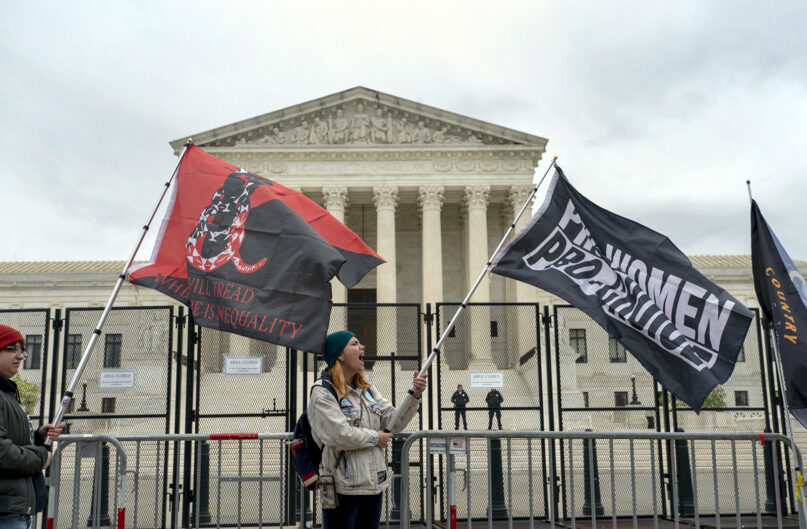(RNS) — Since the 1973 landmark Supreme Court decision in Roe v. Wade legalized abortion in the U.S., legal abortions across the country have declined steadily. Public support for abortion has remained consistent, currently around 61%. And yet, a recent leaked draft opinion from the Supreme Court suggests that a majority of justices are considering overturning this decision and turning over abortion regulation to the states.
The opinion, in which its author, Justice Samuel Alito, makes room for some bizarre allusions to 13th-century British jurisprudence, suggests that abortion rights are the purview of the states’ legislatures and the court should not be involved. It also hints at the issue of religious freedom.
Alito’s draft opinion, of course, implicitly rebuts the notion that termination of a pregnancy is a fundamental right that must be recognized, not legislated. It means that anyone who becomes pregnant has fewer rights over their bodies than are proffered to a corpse or brain-dead person. In these situations, one cannot harvest an organ or remove tissue without prior written consent.
But Alito also overlooks the actual issue at stake. If Roe were overturned, it would abrogate the religious freedom and individual rights of several minority religious communities, including U.S. Jews, Muslims and Hindus. These communities support abortion rights in some or all cases in numbers equivalent to or much greater than the general public. That support is often rooted in their faith and the ethics of individual choice.
RELATED: With Roe in peril, abortion rights advocates prepare appeals to religious liberty
In many American Jewish communities, when the life of the mother is threatened, abortion isn’t just acceptable, it’s required.
Between 2017 – 2020, support for abortion rights among Black communities rose sharply, particularly among Black Protestants, of which 66% support abortion under most circumstances.
U.S. Muslims support abortion rights as well, though by a slimmer margin — 56%. While Catholic support for abortion rights shows a slim majority in favor, at 47%, among Catholic women that number jumps to 55%. But in the largest religious community in the U.S. — white Protestants — support for abortion rights reaches 63%, exceeding the nation as a whole.
Hindu traditions are more complicated. While U.S. Hindu communities express strong support for abortion rights at 68%, mirroring the numbers Pew Research catalogs for all Asian Americans, classical Hindu texts such as the Vedas and Shastras forbid abortion except when the life of the pregnant person is threatened or there are fetal abnormalities. Though the Garbha Upanishad suggests the soul doesn’t attach itself to the fetus until the seventh month, this interpretation is contested.
How does India, the largest country with a Hindu majority, view abortion rights? Abortion has been legal with limitations since 1971 through the Medical Termination of Pregnancy Act, which has been updated four times, most recently in 2021. Currently, abortions are permitted up to 20 weeks after conception with the approval of a certified health care provider.
Failed contraception is considered an acceptable reason for approving an abortion. Women may seek abortions at up to 24 weeks’ gestation in cases of sexual abuse, incest, fetal abnormalities, rape, disability or if the pregnant person is a minor. All abortions are covered by government health care and are performed in public and private facilities.
But the broad support for abortion rights among American Hindus seems to speak to an important aspect of Hindu faith: Individual ethical choice cannot be imposed on others. Although abortion may violate classical Hindu law, most Hindus believe such a position should not be legislated for the population at large.
It may also be an indicator of the social and religious preference for sons, which grounds India’s ban on amniocentesis to determine the sex of the baby. What is clear is that for Hindus, the freedom to make this choice is paramount.
What does all this tell us? People who identify as religious, by and large, support abortion rights as individual choice, even when it may violate tenets of their faith. It also suggests that Jews, Muslims and Hindus see abortion rights as a matter of personal ethics, even if it’s incompatible with their beliefs — a fact represented in an amicus brief to the Supreme Court by a diverse range of religious organizations supporting abortion rights.
So whose religious freedom is at stake for the court? White evangelical Christians, 77% of whom oppose abortion, have been the most active advocates for religious freedom in recent years. What’s more, they see this (and other issues) as a collective matter and a religious imperative that necessitates imposing their views on everyone, even those who don’t share them.
RELATED: Advocate for abortion if you must. But don’t say poor people made you do it.
Now it’s evangelicals’ turn to take a back seat to religious freedom claims of others. Overturning Roe v. Wade would violate the religious freedom of the majority of Christians, Jews, Hindus and Muslims as well as of those who identify as religious “nones.”
Religious freedom means more than the freedom to practice one’s religion; it also affirms the right to be free from the imposition of religion. Removing the constitutional right to an abortion would not only deliver a devastating blow to gender equity, it would, in effect, center white evangelical Christian morality as a governing principle for everyone, fundamentally altering the meaning and impact of the First Amendment.
(Dheepa Sundaram is an assistant professor of religious studies at the University of Denver who writes about digital culture, yoga, nationalism and religion. The views expressed in this commentary do not necessarily reflect those of Religion News Service.)
This column is produced by Religion News Service with support from the Guru Krupa Foundation.





